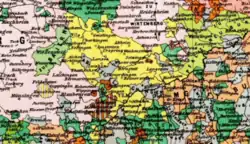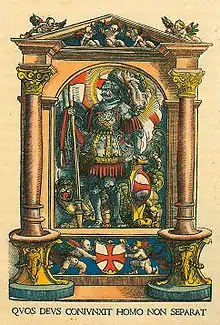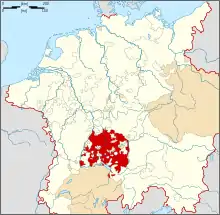Free Imperial City of Ulm
The Free Imperial City of Ulm was a Free Imperial City of the Holy Roman Empire. It is situated on the left bank of the Danube, in a fertile plain at the foot of the Swabian Jura.[1]
Free Imperial City of Ulm Freie Reichsstadt Ulm | |||||||||
|---|---|---|---|---|---|---|---|---|---|
| 1181–1803 | |||||||||
 Flag derived from the coat of arms
 Coat of arms
| |||||||||
 The Free Imperial City of Ulm and surrounding area | |||||||||
| Status | Free Imperial City | ||||||||
| Capital | Ulm | ||||||||
| Government | Republic | ||||||||
| Historical era | Middle Ages; Early Modern Period | ||||||||
• Settlement founded | around 5000 BC | ||||||||
• Gained Reichsfreiheit | 1181 | ||||||||
• Großer Schwörbrief | 1397 | ||||||||
| 1530 | |||||||||
| 1647 | |||||||||
| 1803 | |||||||||
• Annexed by Württemberg | 1809 | ||||||||
| |||||||||
History
Ulm is mentioned as a demesne in 854, and under the Carolingian dynasty it was the scene of several assemblies.[2] It became a town in 1027, and was soon the principal place in the Duchy of Swabia.[2] Although burned down by Henry the Lion, the town soon recovered, becoming a Free Imperial City in 1155.[2] Towards the close of the Middle Ages it played a leading part several times at the head of Swabian Leagues[2] of the 14th century and 15th century. Its trade and commerce prospered, peaking in the 15th century, ruling over a district about 300 square miles (780 km2).[2] It became a Free Imperial City with extensive territorial authority, and having a population of about 60,000. It became Protestant in 1530 and declined after the French Wars of Religion of the 16th century and 17th century. In 1802 it lost its Imperial immediacy and passed to Electorate of Bavaria, being ceded to Kingdom of Württemberg in 1810. In October 1805 General Karl Mack von Leiberich and his 23,000 Austrian troops capitulated to Napoleon here. Ulm is remarkable in the history of German literature as the spot where the Meistersingers lingered longest, orally preserving the traditional folklore of their craft.[2]
In popular culture
Ulm is infamous among players of the game Europa Universalis IV after a screenshot of the game was shared where Ulm had conquered the world, something which is near impossible to do due to its awful strength and expansion opportunities throughout the game.
References
- Ulm. 2012. Encyclopædia Britannica Online. Retrieved 19 June 2012, from http://www.britannica.com/EBchecked/topic/613251/Ulm
- Chisholm, Hugh, ed. (1911). . Encyclopædia Britannica. 27 (11th ed.). Cambridge University Press. p. 567.


